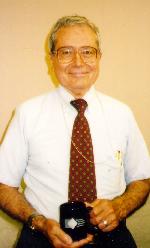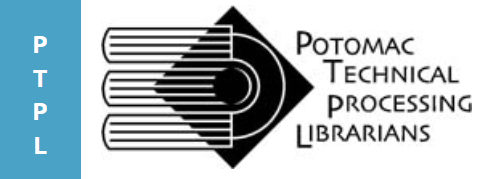The "Historical Moment" is a fixture at the PTPL Annual Meeting. Below are some examples from previous years.
PTPL - Historical Moment - 2018
Presentation at 94th PTPL Annual Conference by Karl Debus-Lopez
We’ve been talking a lot about change today, and we’ll be talking about more change this afternoon. Who says change isn’t good? Look at what a great group of people it’s made us! PTPL members have talked about technological change for years: from nearly the beginning of our history.
- 1947-we talked about the “New developments in the teaching of cataloging”
- 1948-we talked about the “New rules for descriptive cataloging”
- 1965- we talked about “Training for Mechanization”
- 1986 we talked about the “Compleate LibrarianundefinedChanging Roles in a Total-System Environment”
- 1987- we wondered if “Catalogers would be come an endangered species” Surely that’s not happened! Haha!
- 1988 –we learned how to “Buy Technology”
- 1989 We learned how to “integrate format”
- 1990 we learned how to “manage chaos”
- 1991 We learned new systems and new savvy while training to deal with new technologies
- 1993 We learned who was REALLY in the drivers seat
- 1995 we learned how to harness the wind of changes
- 2003 we discussed the change and future of MARC
- 2004 We learned how to serve and preserve digital collections
- 2008 Here we are again riding the wave of change in Technical services
I need to thank our two morning speakers for the great lead-ins they gave to the historical moment. Dr. Tillett provided a wonderful time-line of when various iterations of cataloging rules were published and also mentioned that various groups were consulted before the new editions were published. Ms. Mansfield stated that cost is always a consideration when thinking about changes to rules.
In 1948 PTPL, then called the “
In reading the minutes of this meeting, I was reminded that the more things change, the more they stay the same.
There were 4 major points in the resolution. The first was the recommendation that “every possible simplification” be made that would cut the cost of cataloging without impairing the value of the catalog.
Today, we call this working smarter, faster, and cheaper.
The other 3 points were in support of this first one.
Point 2 was really a request. The group said it understood that the purpose of the new rules was to simplify the catalog card, but that the rules didn’t necessarily reduce the cost of cataloging. The membership believed “that any acceptable code must be designed to simplify both the practice of cataloging and the product of cataloging” and asked that the Library of Congress give its position on this point.
However, the resolution said that these new Rules were closer to the Group’s standard than any compilation yet presented, but that modifications were needed.
Their 4th point was a list of 13 rules that either required too much detail, needed to be modified to supply the user with essential information, needed to be simplified, or were just generally a problem.
The membership voted to adopt the resolution as written. They then began a discussion of specific points in the resolution and from there, went on to catalog problems generally.
Not surprisingly, there was an extended discussion about simplifying the catalog card and cutting cataloging costs. A representative of LC said that these 2 objectives were sometimes in conflict, and asked which should be given precedence. Apparently no one had a good answer because the minutes say “The discussion ended with a request that LC clarify its stand on these objectives at some later date.” We basically passed the buck on a decision concerning one of the many knotty problems that come up when talking about cataloging rules.
As I read through the minutes, there were several points that resonated with me as a former cataloger because I could see the evolution of some of our catalog rules and was reminded of what life was like before computers. Someone suggested that it would be better to have rules for modern books, and another set for old and rare books.
There was also a discussion as to whether music should be cataloged like books or if entirely different ways should be developed, and whether the rules for map cataloging were inadequate. Someone suggested that latitude and longitude should be included in those records. Someone else said the new rules for capitalization made typing cards more difficult and time-consuming. Anyone who has ever used a manual typewriter knows how hard it is to press the keys.
The discussion I liked best was the one about serial records. Should serials be cataloged from the latest volume, or, should all libraries follow the example of the Army medical Library which made each change of title a new entry? A representative of the Department of Agriculture Library said they cataloged from the earliest volume received and made added entries for changes in author and/or title. Not surprisingly, no agreement on how best to handle serial changes came out of this meeting.
All in all, the minutes reveal a spirited debate between dedicated professionals on changes they cared deeply about. Like I said earlier, the more things change, the more they stay the same.
The ALA, ALCTS, Council of Regional Groups, with which PTPL is affiliated celebrated its 75th anniversary last year, and this year PTPL is celebrating its 75th anniversary.
In 1922, as Chair of the ALA Committee on the Reorganization of the Catalog Section, Margaret Mann was calling upon catalogers in various parts of the country to discuss the problems involved with such a reorganization. She called regional meetings of catalogers to discuss common problems. The first regional meeting was in St. Paul-Minneapolis. Then meetings followed in Chicago, Cincinnati, and Washington, DC.
On April 10, 1923, Margaret Mann met with a group of catalogers from Maryland, Virginia, and the District of Columbia at a dinner sponsored by ALA and a DCLA committee chaired by Harriet Pierson. It was at this meeting that PTPL was "conceived", and its name was to be the Maryland, Virginia and District of Columbia Regional Group of Cataloguers and Classifiers.
Margaret Mann submitted her committee report at the 1923 ALA Conference and recommended that the Catalog Section sanction regional meetings and adopt rules for affiliated groups. Each group was to consist of at least 10 members, would have its own officers, and determine its own dues. Each group would hold at least one meeting each year and would sent a report of its meeting to ALA. It was also recommended that an Advisory Council be formed consisting of one representative from each affiliated group. The recommendation was adopted by ALA.
At the 1924 ALA Conference, it was reported that Washington, DC, among others, were planning meetings. PTPL, (as it came to be known in 1960), met on its own for the first time on November 25, 1924, in Richmond, Virginia. Charles Martel, Harriet Pierson and Ellen Hedrich were the committee presenting the constitution and by-laws, which were adopted. Wilmer Lee Hall, of The Virginia State Library was elected the first Chair and PTPL was "born"; being one of the first affiliated regional groups.
By 1925, the list of groups was growing rapidly. Some did not survive, but some of the original groups are still active today and PTPL stands among them. There are now about 47 affiliated groups and ours is approximately 400 strong. We have 180 corporate members and 239 individual members. Just this year we have added 41 new members, 2 of whom are students. Our members have actively participated both on regional and national levels serving PTPL and the Council of Regional Groups.
The Council of Regional Groups continues to introduce librarians to ALA/ALCTS by involving members of regional groups with CRG and then nurturing and developing them for leadership in the total organization. PTPL's members have served, are serving, and have been appointed or elected to serve CRG in the following capacities: Regional Representatives, Members of the Affiliate Relations Committee, CRG representatives to the ALCTS Membership and Program Committees, and Secretary of CRG.

Kay D. Guiles, 40 year member
This year we conducted a survey to find the PTPL members who have been with for the longest period of time. The following members were honored and received PTPL mugs: Kay D. Guiles of the Library of Congress, who is a 40 year member; Mary K. Feldman of Mary K. Feldman Associates, a 35 year member; and Kathern J. Miraglia of Catholic University of America, a 30 year member.
Happy 75th Anniversary, Potomac Technical Processing Librarians!
Submitted by Marianne C. Rough, Prince George's Community College
Based on:
Potomac Technical Processing Librarians - A History by Paula Kieffer, Baltimore County Public Library and Peggy Marguart, Enoch Pratt Library
and
History of Council of Regional Groups by Mary Faust, Ball State University Library, Muncie, IN
